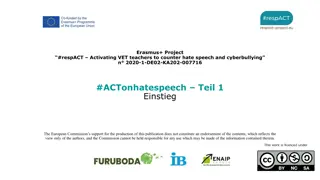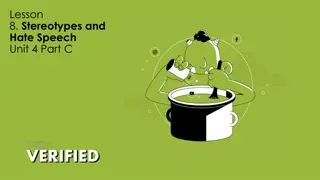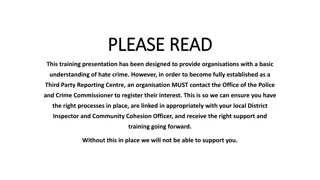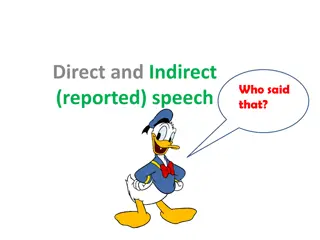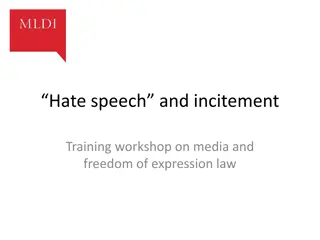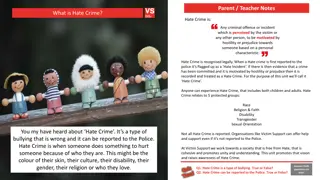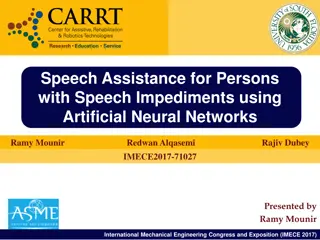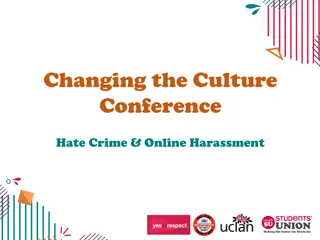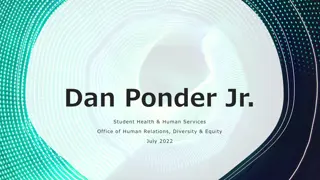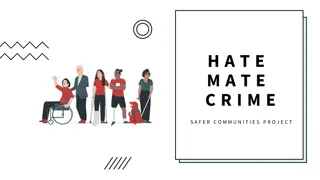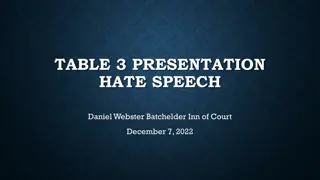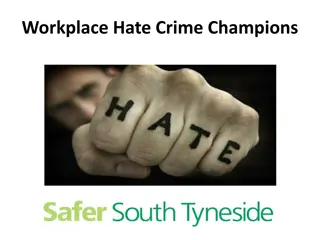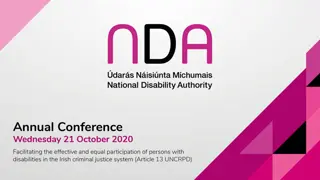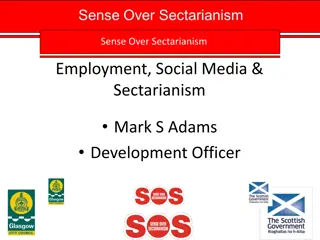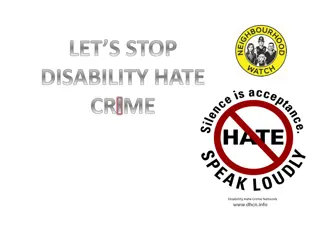Understanding and Combatting Online Hate Speech
Explore the impact of hate speech and xenophobia online among 15-16-year-olds, learn ways to counter it, and delve into the relationship between hate speech, xenophobia, and the internet. Engage with resources and discussions to address these issues effectively.
Download Presentation

Please find below an Image/Link to download the presentation.
The content on the website is provided AS IS for your information and personal use only. It may not be sold, licensed, or shared on other websites without obtaining consent from the author. Download presentation by click this link. If you encounter any issues during the download, it is possible that the publisher has removed the file from their server.
E N D
Presentation Transcript
DIGITAL CITIZENSHIP YEAR 11 (AGE 15-16) Countering Hate Speech Online commonsense.org/education/uk/digital-citizenship Shareable with attribution for noncommercial use. Remixing is permitted.
Essential Question How can we counter online hate How can we counter online hate speech and xenophobia? speech and xenophobia? commonsense.org/education/uk/digital-citizenship Shareable with attribution for noncommercial use. Remixing is permitted.
Learning Objectives ll Describe the relationship between hate speech and xenophobia. Analyse how the internet has contributed to an increase in hate speech and extremist views. 2 2 Describe one way to use the internet to combat one type of hate speech. 3 3 commonsense.org/education/uk/digital-citizenship Shareable with attribution for noncommercial use. Remixing is permitted.
WATCH + DISCUSS Teen Voices: Hate Speech Online Teachers, for the lesson plan associated with this video, please visit: https://www.commonsense.org/education/digital-citizenship/lesson/countering-hate-speech-online As human beings, we thrive on social connections and group associations. But this tendency can also lead to us to be suspicious of people outside our group. This fear -- xenophobia -- can often fuel online communication that's offensive, hateful, or even threatening. In this video, teens share their candid thoughts about online hate speech, including why they think it happens, and the the ways they respond when they encounter hate speech online. Discuss: What examples of hate speech do students describe in the video? Why do they say people post hate speech? Do you agree? To watch this video on the Common Sense Education site, click here. commonsense.org/education/uk/digital-citizenship Shareable with attribution for noncommercial use. Remixing is permitted.
KEY VOCABULARY Hate speech A verbal attack targeting someone because of a group they belong to (e.g., their race, gender, religion, ability, sexual orientation, etc.) commonsense.org/education/uk/digital-citizenship Shareable with attribution for noncommercial use. Remixing is permitted.
KEY VOCABULARY Xenophobia The fear or distrust of someone or something that is foreign or unknown commonsense.org/education/uk/digital-citizenship Shareable with attribution for noncommercial use. Remixing is permitted.
ACTIVITY: THE INTERNET AND EXTREMISM Part 1 Directions In your group, choose two of the resources to review. As you review them, track what each says about hate speech, xenophobia and the internet, and what we can do to address the problems they cause. Capture your thoughts in the notes section. Review additional resources as time allows. commonsense.org/education/uk/digital-citizenship Shareable with attribution for noncommercial use. Remixing is permitted.
KEY VOCABULARY Extremism The holding of extreme political or religious views commonsense.org/education/uk/digital-citizenship Shareable with attribution for noncommercial use. Remixing is permitted.
ACTIVITY: CLASS DISCUSSION How do xenophobia and the internet contribute to hate speech? How can they be addressed online? commonsense.org/education/uk/digital-citizenship Shareable with attribution for noncommercial use. Remixing is permitted.
WATCH + DISCUSS Three Questions for Dr Erin Marie Saltman 1. Can one differentiate between online and offline hate speech? 2. What is Counter Speech? 3. What would be your recommendation for persons who want to take action against online racism? Reflect: Why does Dr. Saltman say that people are sometimes more extreme online than in person? What is "counterspeech"? What examples does she give? commonsense.org/education/uk/digital-citizenship Shareable with attribution for noncommercial use. Remixing is permitted.
KEY VOCABULARY Counterspeech Messages that challenge or debunk extremism and stereotypes commonsense.org/education/uk/digital-citizenship Shareable with attribution for noncommercial use. Remixing is permitted.
Examples of Counterspeech 1. Video or photo creation. Satirical or playful videos or images that are aimed at young people and that make fun of phobias (Islamophobia, homophobia, etc.). 2. Storytelling. Social media or blog posts that tell a personal story of xenophobia or stereotyping. 3. Music. Songs or lyrics that challenge hateful messaging aimed at particular groups of people (immigrants, ethnic or religious groups, etc.). commonsense.org/education/uk/digital-citizenship Shareable with attribution for noncommercial use. Remixing is permitted.
ACTIVITY: COUNTERING HATE SPEECH Part 2 Directions With a partner, watch the "YouTube Creators for Change: Humza Arshad" video and then answer the questions below. commonsense.org/education/uk/digital-citizenship Shareable with attribution for noncommercial use. Remixing is permitted.
WATCH YouTube Creators for Change: Humza Arshad Humza Arshad is a British and Pakistani YouTube comedian based in the U.K. Widely known for his Diary of a Badman series on YouTube, Humza also uses his self-deprecating comedy to tackle difficult issues like extremism and gang violence. He has even done school tours in the U.K where he s spoken to kids about embracing their identities and countering hate and extremism. For more on Humza, visit his channel: https://www.youtube.com/user/HumzaProductions commonsense.org/education/uk/digital-citizenship Shareable with attribution for noncommercial use. Remixing is permitted.
commonsense.org/education/uk/digital-citizenship Shareable with attribution for noncommercial use. Remixing is permitted.
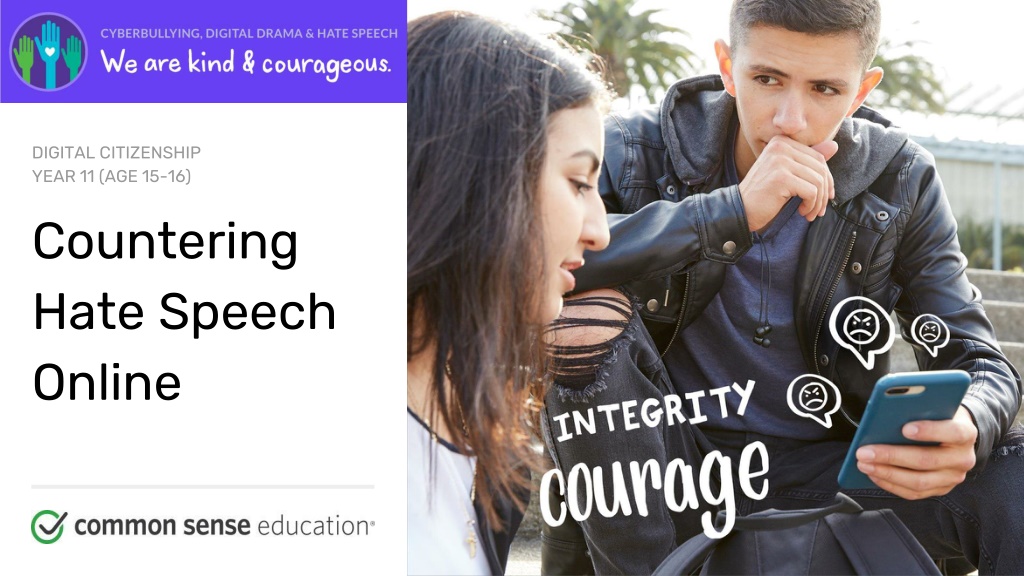









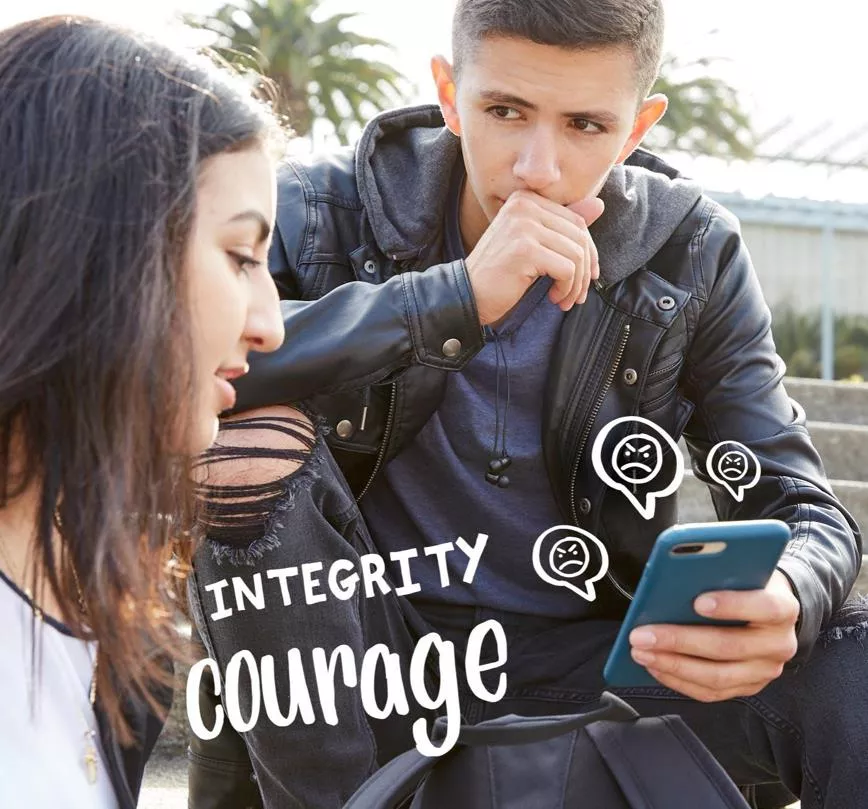

![Prevention and Combating of Hate Crimes and Hate Speech Bill [B.9B.2018]](/thumb/60513/prevention-and-combating-of-hate-crimes-and-hate-speech-bill-b-9b-2018.jpg)
